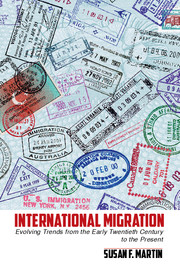Book contents
- Frontmatter
- Contents
- Foreword
- Acknowledgments
- List of Acronyms
- Introduction
- 1 Early Roots
- 2 “The Problem of Refugees”
- 3 Labor Mobility
- 4 Orderly and Humane Migration Management
- 5 Trafficking in Persons
- 6 Migration and International Security
- 7 Migration, the Environment, and Climate Change*
- 8 Migration and Development
- 9 Towards the Future
- Bibliography
- Index
- References
1 - Early Roots
Published online by Cambridge University Press: 05 August 2014
- Frontmatter
- Contents
- Foreword
- Acknowledgments
- List of Acronyms
- Introduction
- 1 Early Roots
- 2 “The Problem of Refugees”
- 3 Labor Mobility
- 4 Orderly and Humane Migration Management
- 5 Trafficking in Persons
- 6 Migration and International Security
- 7 Migration, the Environment, and Climate Change*
- 8 Migration and Development
- 9 Towards the Future
- Bibliography
- Index
- References
Summary
This chapter explores the origins of international efforts to manage movements of people, focusing on developments in the early twentieth century. After briefly discussing the rather open system that prevailed in the nineteenth century and the closing of that system as World War I approached, the chapter discusses patterns of migration that affected these developments. Specifically, new challenges are addressed, such as the advent of immigration quotas, passports, and visas as mechanisms to balance perceived concerns about security with the desire to facilitate beneficial mobility. This chapter also discusses the ways in which growing nationalism in Europe in the pre-World War I period heralded an era in which mass displacement became the norm as new states emerged from the revolution and the break up of the Hapsburg, Ottoman, and German empires.
The Treaty of Versailles created the first international organization that addressed issues related to migration of workers – the International Labor Organization (ILO). The ILO's constitution was drafted between January and April 1919 by a commission chaired by Samuel Gompers. It included representatives from Belgium, Cuba, Czechoslovakia, France, Italy, Japan, Poland, the United Kingdom, and the United States. The constitution created a tripartite organization, including representatives of governments, employers, and workers in its executive bodies. The preamble to the constitution listed a number of areas in which the ILO could make improvements, including “protection of the interests of workers when employed in countries other than their own.” Some of the earliest conventions adopted by the ILO pertained to employment of seafarers – an appropriate area of international attention since much of their work involved moving from country to country outside the jurisdiction of any one government. For the most part, however, the ILO's attempts to promulgate standards on migrant workers did not yield positive effects in the subsequent intra-war period. Negotiations took place on such issues as inspection of migrant workers on ships, pension rights of migrant workers, and migration for employment, but these conventions were shelved or withdrawn. It was not until 1949 that the Convention on Migration for Employment was adopted, and it did not come into force until 1952 (and even then with relatively few state parties).
- Type
- Chapter
- Information
- International MigrationEvolving Trends from the Early Twentieth Century to the Present, pp. 26 - 57Publisher: Cambridge University PressPrint publication year: 2014



